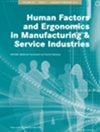MAPO方法评估医院病房人工操作病人的风险:一项验证研究
IF 2.2
3区 工程技术
Q3 ENGINEERING, MANUFACTURING
Human Factors and Ergonomics in Manufacturing & Service Industries
Pub Date : 2020-11-01
DOI:10.1177/0018720819869119
引用次数: 8
摘要
目的为提高评价客观性,对医院病人运动与协助(MAPO)方法进行一些调整后,验证其有效性。接触病人人工操作的操作人员数量正在显著增加。MAPO于1999年提出,是一种评估病人人工处理风险的有用工具,具有分析速度快的特点。它最近进行了改进,以更好地匹配2012年ISO(国际标准化组织)技术报告。方法对2014 - 2016年意大利普利亚地区26家医院进行多中心研究。应用MAPO方法对116个病房患者人工操作风险进行评估。在过去的12个月里,共有1998名暴露的受试者被评估是否存在急性腰痛。结果仅12%的受访病房处于绿色暴露水平(MAPO指数为0.1 ~ 1.5),37%的病房处于平均暴露水平(MAPO指数为1.55 ~ 1.5),51%的病房处于较高暴露水平(MAPO指数>5)。结果证实,MAPO指数水平升高与急性腰痛发作次数呈正相关(调整后p趋势= 0.001)。结论近年来的改进使评估程序更加客观。尽管有这些变化,研究证实了MAPO方法预测腰痛的有效性。应用MAPO方法是一种准确识别和评估工作场所风险的风险评估工具。正确应用该方法可显著改善工作条件。本文章由计算机程序翻译,如有差异,请以英文原文为准。
MAPO Method to Assess the Risk of Patient Manual Handling in Hospital Wards: A Validation Study
Objective To validate the effectiveness of MAPO method (Movement and Assistance of Hospital Patient) after the introduction of some changes to improve assessment objectivity. Background The number of operators exposed to patient manual handling is increasing considerably. MAPO, proposed in 1999 as a useful tool to estimate the risk of patient manual handling, is a method characterized by analytical quickness. It has recently been improved to better match the 2012 ISO (International Organization for Standardization) technical report. Methods A multicenter study was conducted between 2014 and 2016 involving 26 Italian hospitals in the Apulia Region. MAPO method was used to assess the risk of patient manual handling in 116 wards. A total of 1,998 exposed subjects were evaluated for the presence or absence of acute low back pain in the previous 12 months. Results Only 12% of the investigated wards fell in the green exposure level (MAPO index = 0.1–1.5), 37% resulted in the average exposure level (MAPO index = 1.51–5) and the remaining 51% in the higher exposure level (MAPO index >5). The results confirmed a positive association between increasing levels of MAPO index and the number of episodes of acute low back pain (adjusted p trend = .001). Conclusion The improvements made over the past years led to a more objective assessment procedure. Despite the changes, the study confirmed the effectiveness of MAPO method to predict low back pain. Application MAPO method is an accurate risk assessment tool that identifies and evaluates workplace risks. The proper application of the method significantly improves working conditions.
求助全文
通过发布文献求助,成功后即可免费获取论文全文。
去求助
来源期刊
CiteScore
5.20
自引率
8.30%
发文量
37
审稿时长
6.0 months
期刊介绍:
The purpose of Human Factors and Ergonomics in Manufacturing & Service Industries is to facilitate discovery, integration, and application of scientific knowledge about human aspects of manufacturing, and to provide a forum for worldwide dissemination of such knowledge for its application and benefit to manufacturing industries. The journal covers a broad spectrum of ergonomics and human factors issues with a focus on the design, operation and management of contemporary manufacturing systems, both in the shop floor and office environments, in the quest for manufacturing agility, i.e. enhancement and integration of human skills with hardware performance for improved market competitiveness, management of change, product and process quality, and human-system reliability. The inter- and cross-disciplinary nature of the journal allows for a wide scope of issues relevant to manufacturing system design and engineering, human resource management, social, organizational, safety, and health issues. Examples of specific subject areas of interest include: implementation of advanced manufacturing technology, human aspects of computer-aided design and engineering, work design, compensation and appraisal, selection training and education, labor-management relations, agile manufacturing and virtual companies, human factors in total quality management, prevention of work-related musculoskeletal disorders, ergonomics of workplace, equipment and tool design, ergonomics programs, guides and standards for industry, automation safety and robot systems, human skills development and knowledge enhancing technologies, reliability, and safety and worker health issues.

 求助内容:
求助内容: 应助结果提醒方式:
应助结果提醒方式:


